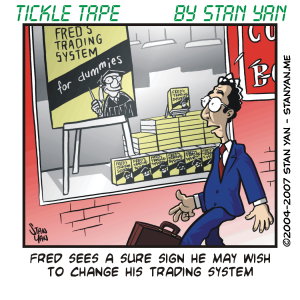The ultimate way to trade is with an objective, logical mindset. But when your money is on the line, it’s hard not to allow your emotions to influence your decisions. When you are fearful and uncertain, it’s easy to panic and makes a trading error. To deal with uncertainty, it’s tempting to create illusory expectations and start believing that what you expect to occur “must” actually happen. When things don’t turn out the way you expect, it’s easy to feel frustrated and angry. You want to blame someone, but sometimes there is no one to blame. Rather than acting emotionally, it’s wise to keep things objective. Try to stay calm and rational.
The markets are composed of people, lots of them with many different roles. Fellow market participants trade the same stocks you’re trading. Market analysts make their predictions, and broadcasters report these predictions. There are many people trying to make money from the markets in their own way, whether it is reporting, forecasting, or trading. It’s easy to make trading interpersonal and believe that unless the actions of people involved in the markets are out to help you, they are against you.
But as a trader, you must not look at the market in conventional, interpersonal terms. Don’t think that people’s motives and actions have anything to do with you. It is vital that you forget that you are dealing with people and just focus on the price of the stock and the factors that explain or correlate with it. It’s often hard to do, however. For example, depending on what you expected to happen during the first week of 2005, last week may have been a rough week for many investors.
There was a lot of selling and the gains realized at the end of the year dissipated. If you were betting that gains at the end of 2004 would be sustained into the New Year and lost because of it, it may be tempting to blame the people who sold off their positions, focusing solely on how their actions hurt you. After all, it was people who sold and may have thwarted your trading plan. But no one is taking specific action against you. Everyone is merely trying to make money from the markets. They are just doing their jobs. Don’t take it personally. It’s just business.
Even when you consider a specific stock, it’s useful to avoid thinking interpersonally. People may be involved, and their actions may impact stock prices, but again, no one is doing anything specifically to harm you, or at least it isn’t worth thinking about it that way.
For example, while many stock prices went down last week, Apple Computer (AAPL) went up. Apple has been selling a lot of iPods, and on Wednesday, AAPL is expected to post earnings of 46 cents per share. In the past 12 months, APPL has increased by 200%. Today at Macworld Expo, CEO Steve Jobs is expected to introduce a new low-cost Macintosh computer in order to persuade Windows iPod users to “switch” to Apple computers to more easily organize their music files.
Who knows what the folks at Apple are going to do today or tomorrow? Will they introduce a low-cost computer to increase profits? Will their actual earnings reports match those of analysts? There are good reasons to go long or short. You could have known that the recent news about APPL is just a lot of hype and that you should have anticipated the behaviour of the masses by selling off the shares you bought a few months ago while everyone else was buying last week.
On the other hand, some traders may be going long, hoping that the trend of the past year will continue and possibly accelerate based on favourable earnings reports and product announcements that may lead to even more profits in the future. The point here is not to evaluate trading strategies, but to illustrate how you must keep things objective. Sure, people are involved in what happens, but it doesn’t help to look at things that way.
Unless you have inside knowledge or a crystal ball, we don’t really know what is going to happen today, tomorrow, next week or next year. In the end, you must make a decision based on the available information you have and make an educated guess. Some traders will be wrong, others will be right. What you must do is realize that there is an element of uncertainty in the end and that when an outcome is uncertain, you are taking a risk. Psychologically, you must accept risk and uncertainty.
It’s part of trading. It may be ideal if we could eliminate risk, but we can’t. It’s vital that you take things in stride and view events as somewhat unpredictable as to if you are flipping a coin and betting on the outcome. If you flip it enough times, the odds can work in your favour. But if you are stunned by the outcome, panic, and are afraid to trade, you won’t make much progress. So stay objective, rational, and keep trading.
People may be involved with regard to how prices fluctuate, but if you look at it that way, you’ll just get upset. Live by the motto, “Ultimately, it’s impossible to know what will happen, and it’s just business. It isn’t personal.”


